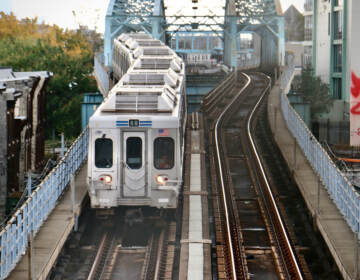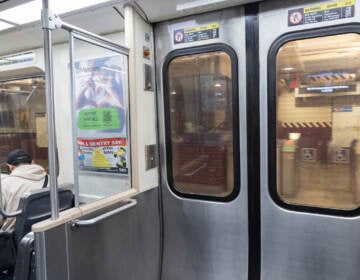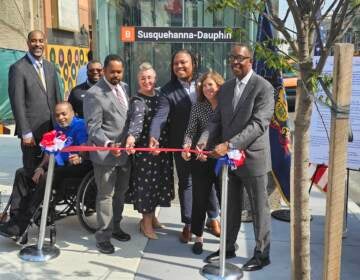Stakeholders’ tough fight for infrastructure funding

June 2, 2010
By Anthony Campisi
For PlanPhilly
As the fallout settles on the state’s infrastructure following of the failure to toll Interstate 80, a loose coalition of transit advocates, labor unions and businesses is forming to push for a solution. The question is whether they will be able to fight against the existing political currents to raise taxes or fees in an election year.
Transit advocates aren’t wildly optimistic about their chances.
Peter Javsicas, executive director of PenTrans, a statewide transit advocacy group, said he heard three powerful lawmakers — Senate Majority Leader Dominic Pileggi, House Transportation Committee chairman Richard Geist and Senate Transportation Committee chairman John Rafferty — discount the possibility of a fix during this legislative session. They were speaking at a forum on the state’s infrastructure.
And Steve Wray, executive director of the Economy League of Greater Philadelphia, said that advocates might focus on a two-pronged solution: a short-term infusion of money to close out Gov. Rendell’s term and then a longer-term, stable source of funding after the new governor takes office.
He said a short-term fix might focus on getting temporary infusions of federal money or figuring out how the state or Pennsylvania Turnpike could issue bonds to pay for much needed road repair and mass transit improvements.
Act 44, which established the current state transportation funding system, relies in part on the Turnpike issuing bonds against future toll collections. Pat Deon, a Turnpike Commission member and chairman of the SEPTA Board, has said the Turnpike wouldn’t be willing to issue more bonds without having access to toll revenue from I-80.
Wray also said that public-private partnerships might be the key to getting some stalled projects funded.
At the same time, various stakeholders are only just now beginning to develop and implement strategies for getting legislation passed. As Barry Seymour, executive director of the Delaware Valley Regional Planning Commission, put it: Lots of groups have a stake in transportation funding, but they haven’t yet coalesced into an organized political force.
That process may have begun when the Keystone Transportation Funding Coalition — a collection of transit advocates, unions and businesses — reasserted itself in a press conference in Harrisburg last week. The coalition was instrumental in pushing for Act 44’s passage in 2007 and had been dormant since.
A problem this time around, though, is there is no specific legislative solution on which policymakers and advocates have settled.
The ideas proposed in Act 44 came out of the report of the Transportation Funding and Reform Commission, which was established by the governor in 2005 and included among its members political and policy heavyweights.
This time around, there’s no similar report from which the legislature can readily draw inspiration. In essence, Wray explained, it’s harder to advocate for or against legislation that hasn’t yet been crafted. “Right now, there’s not a focal point on where you would put that action,” he said, adding that a recently released infrastructure report card of the state might provide transportation advocates with some ammunition. The state’s roads and transit agencies received a D-minus.
Instead, groups like the Economy League and the DVRPC are trying to pull together a fuller picture of the ramifications of deferred road and transit maintenance and provide lawmakers with a menu of funding options.
SEPTA and the governor have also taken up this tactic, holding a press conference several weeks ago at the aging Wayne Junction power substation to demonstrate the precarious state of much of the region’s critical but aging infrastructure.
Still, much work needs to be done before transportation spending becomes a high-profile issue for the average voter, according to Andy Sharpe, spokesman for the Delaware Valley Association of Rail Passengers, a rider advocacy group. DVARP has been trying to get its members to raise the issue by writing letters to local newspapers and to their state lawmakers, but Sharpe said there’s no “master strategy” that all the players in this effort are following.
SEPTA also has to walk a fine line in its advocacy.
Though it’s the state’s largest public transit agency, SEPTA officials have avoided endorsing any of the plans put forward so far for fear of getting caught up in the politics surrounding fee or tax increases. SEPTA spokesman Andrew Busch also said that it’s important to frame the debate in terms of the state’s wider infrastructure needs to build support for any legislative fix — for instance, though few people in Central Pennsylvania take public transit, they all rely on state-maintained roads and bridges.
For now, much of the public effort around a legislative fix seems focused on hearings the state House Transportation Committee is holding throughout the state.
Regional players — like SEPTA general manager Joe Casey and the DVRPC’s Seymour — will be testifying at a hearing at St. Joseph’s University on Friday, and transit groups will also be sending members as a show of support.
The hearing is scheduled for 10 a.m. in the Teletorium of Mandeville Hall, at 54th Street and City Avenue.
Contact the reporter at campisi.anthony@gmail.com
WHYY is your source for fact-based, in-depth journalism and information. As a nonprofit organization, we rely on financial support from readers like you. Please give today.






